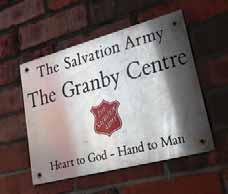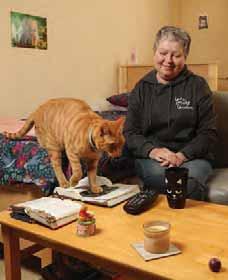
4 minute read
Brothers in adversity
Steve Loveland highlights the way homelessness services in Dublin are responding to the coronavirus crisis
ON 29 February the chief medical officer for the Irish Department of Health announced that the coronavirus pandemic had spread to the Republic of Ireland. In the weeks since there has been a fundamental shift in how we live our lives. Many of us have come to see the reality of Proverbs 17:17: ‘A friend loves at all times, and a brother is born for a time of adversity.’
The response among homelessness service providers was swift and rose as a single voice. In the first week of March I began to receive calls from others across the sector offering support and asking for a commitment to work together in our response.
The priority has been to ensure our vital services remain open for Ireland’s most vulnerable people. One of the first examples of the cohesive response was the Crisis Cover Initiative. This aims to provide a crisis relief panel to homelessness and disability charities impacted by significant staff absences – absences that make it increasingly hard for essential services to stay open and disproportionately affecting some of the most vulnerable members of the population.

This inter-agency initiative has been supported by leading homelessness and care services, including The Salvation Army. While the primary aim remains to help the sector access crisis support staff when they need it, there is an additional benefit. On the day of the first confirmed case the jobless rate in the Republic was 4.8 per cent. By the end of March that rate had risen to 17 per cent. The Crisis Cover Initiative provides an immediate opportunity for many of those recently unemployed people to find work again.
Small community groups are forming to fill gaps in service provision and care. The difficulties in securing personal protective equipment and alcohol-based hand sanitisers have been resolved by a roller blinds manufacturer creating visors for frontline workers and a gin distillery supplying Salvation Army services with bespoke hand sanitisers through our distribution service operating out of the Granby Centre Lifehouse in Dublin.
Services in Dublin are coping admirably with the challenges thanks to committed staff and a supportive management team that is learning to become comfortable with an increasing level of discomfort.
The Salvation Army’s St Bricin’s Night Shelter, which is managed out of York House, was closed to accommodate military personnel but reopened overnight as a 24-hour service in nearby Coleraine Street without a single client needing to be accommodated elsewhere during the transition.
At the Granby Centre we are accommodating 100 clients across a range of services, providing personal care and medication management for 31 clients twice a day and for a number of clients three times a day. In addition to this a free GP service to the wider homeless population operates out of the service for five days a week and is seeing 250 to 300 additional clients every week. All clinics are open-access drop-in and are led by Dr Austin O’Carroll of GMQ Medical, which provides free GP services to people experiencing homelessness in Dublin. Dr O’Carroll has also been chosen as the clinical lead for people experiencing homelessness in the Dublin area during the coronavirus crisis.

Chaplain Major Stuart Dicker with a service user (before social distancing guidance was issued)
One aspect of the homelessness response has become a nationwide initiative: the idea of ‘cocooning’. This is a measure to protect people aged over 70 and those with serious underlying medical conditions that put them at high risk of severe illness from coronavirus. Cocooning aims to keep people in these categories safe by minimising interaction with others. They are strongly advised to stay at home at all times and avoid any face-to-face contact for a number of weeks.
Within the homelessness services, cocooning has resulted in the commandeering of more than 400 additional hotel rooms that otherwise would have been let as holiday rentals. Those most at risk have been cocooned in these hotel rooms and are supported remotely by outreach teams.
The pandemic means we are required to stay away from the very people who give meaning to our lives. The Salvation Army’s motto ‘heart to God – hand to man’ is suddenly contrary to our necessary response. Our natural inclination to reach out to people, not only spiritually but also physically, has been removed. To touch another person, to physically comfort them or hold their hand in their distress is no longer possible.
This has markedly changed how we do our jobs but there is a resilience that must be acknowledged. This resilience is understood best through a traumainformed lens; we are reminded that everyone’s response to this trauma is unique to them and their experience. Similarly, the response varies depending upon the degree to which the present traumatic event is triggering past experiences.

There is much we can learn from those we are charged to protect. For many of our clients, social isolation and restrictions are so much a part of their normative experience that the present crisis simply allows others to share in their lived story more connectedly.
I hope we are changed by our experience. Ireland is defined by community. This has been the provenance of many of her prior troubles, but today a community born out of our shared response is standing together as one by standing apart. One cannot help but be reminded of the following passage of Scripture: ‘The Lord said, “Behold, they are one people, and they all have the same language. And this is what they began to do, and now nothing which they purpose to do will be impossible for them”’ (Genesis 11:6 New American Standard Bible).
STEVE IS CENTRE MANAGER, GRANBY CENTRE LIFEHOUSE, DUBLIN









